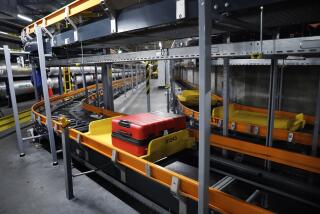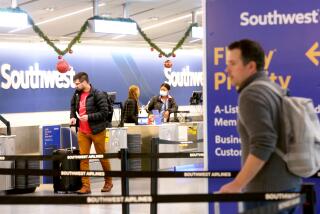Bad Credit Rating Keeps Drug Agent Planes Grounded
- Share via
WASHINGTON — Federal drug enforcement agents often say they do not get enough credit--but lately, agents from the U.S. Customs Service have not been getting any credit at all.
From California to Florida, customs agents patrolling the borders in search of drug smugglers have been abashed to find that their credit accounts for repairing and refueling surveillance airplanes are no good.
In San Diego, a broken propeller grounded a plane when a repairman refused to accept the pilot’s word that the government was good for the money. And in Puerto Rico, a customs pilot confidently taxied up to a refueling station--only to be told he would have to pay cash.
In some cases vendors have refused services altogether, while in others the government has had to agree to pay more than usual to keep its drug agents aloft.
The fuel foul-up began several months ago when the customs agency, a branch of the Treasury Department, stopped paying its bills because invoices were misplaced after it consolidated its administrative offices in Indianapolis.
But the problem remained largely unpublicized until late November, when a House subcommittee that oversees the government’s war on drug smuggling discovered it while interviewing customs agents across the country.
When asked about their plight Friday, agents’ reactions ranged from stolid embarrassment to resigned humor. One California agent declared wryly: “It’s not a problem--it’s a challenge.”
Problems Called ‘Short-Term’
At customs headquarters in Washington, spokesman James Mahan called the problems “short-term” and asserted that they “are in the process of being addressed or have already been resolved.”
Mahan said customs officials are “greatly appreciative” of efforts in Congress “that have helped to identify problems like these in order that we can improve our operations and effectiveness.”
Rep. Glenn English (D-Okla.), chairman of the House Government Operations subcommittee on government information, justice and agriculture that uncovered the predicament, called the situation “incredible.” Surveillance planes grounded “because Uncle Sam won’t pay the bills” have been “turned into worthless junk,” he said.
English, a frequent critic of the Administration’s anti-drug effort, said that he views the fuel incident as symptomatic of larger problems at the Customs Service. Saying that he has scheduled a hearing later this month into the overall issue, he vowed to ask customs officials and others why the agency has been beset by so many problems.
However, he said that customs agents in the field should not be embarrassed by their plight. “It’s the Reagan Administration and the country that should be ashamed,” he said. “These men are laying their lives on the line (in the battle against drug smugglers), and they are being asked to do so without resources.”
Seeks to Bolster Image
The foul-up emerged just as the Customs Service had begun to bolster its image as an important weapon in the government’s war on drug smuggling. In the past, congressional critics have accused the service of failing to properly maintain its boats and planes and of failing to seek enough money from Congress to do its job.
But as part of the government’s overall effort to stem the flow of cocaine and other illegal drugs into the country, the customs agency had stepped up its activities.
With agents in 41 districts nationwide, using helicopters and boats as well as planes, the service reported seizing more than 50,000 pounds of cocaine during fiscal 1985--almost twice the amount seized the previous year.
However, the current problem has set back the effort, at least in the minds of congressional critics, one of whom said: “Clearly, if they can’t put gas in their airplanes, they ain’t going around busting people.”
More to Read
Sign up for Essential California
The most important California stories and recommendations in your inbox every morning.
You may occasionally receive promotional content from the Los Angeles Times.













